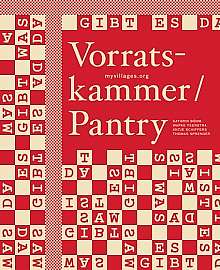Vorratskammer
Project and book

The gathering of goods started during the summer of 2010, and the larder filled up along questions, themes, collaborations and discoveries encountered by the project team. Who produces what kind of food in and around Berlin? What does it mean to be local in a multicultural and cosmopolitan context? Where do animals live and where are they killed? Should we have something of everything or just serve potatoes? Can a wild boar be organic? What if we have a wet summer and the harvest drowns in rain? Where do the rural and the urban meet?
What was clear from the beginning, was that only what had gone into the larder could be used to feed the festival. It was also clear that we didn't want to introduce criteria such as exclusively local or exclusively organic. We wanted to decide what goes into the larder through getting to know and working with producers who were based locally.
We compiled the larder from food that already existed, things that had to grow first and new items to be thought out collectively. Innovative production methods were equally interesting as standard, we worked with small and large amounts, looked at combined harvesters and crafts, new technologies and rose scented lemonade.
Bartering was involved, as well as lots of presents, proper market price purchase and common goods.
In August 2011 everything that had been collected and prepared so far entered one large physical pantry at the Haus der Kulturen der Welt. The catering could begin.
The produce was used to prepare food for varying occasions and groups of visitors during the festival. We had a permanent outdoor summer kitchen, festive banquets, the Fifteen Minutes of Rare Goods, a BBQ and water and beer from the tap.
The Vorratskammer Garden House on the roof terrace became a meeting point for many of the 80 co-producers and the general public. There were plenty of conversations, explanations, discussions alongside food and drinks and simply sitting together.
On the last evening of the Festival, following the Big Eat-It-All-Up, the larder was empty again.
Kathrin Böhm, Wapke Feenstra, Antje Schiffers
mit Thomas Sprenger
Kontakt: vorratskammer[at]myvillages.org